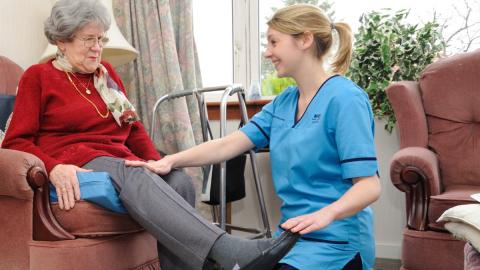A debate was held in Scottish parliament this week (Thursday 30 May) to discuss the physiotherapy staffing shortage in the country.
The debate was secured by Alex Rowley, Labour MSP for Mid Scotland and Fife, who was prompted to table a motion following a letter he received from a CSP member. He highlighted that it was part of a wider issue around the failure of workforce planning within NHS Scotland.
Ahead of the debate, the CSP press team secured an article in the Herald to highlight this issue and the record high physiotherapy vacancy rates across the country, averaging 10 per cent across NHS Scotland. It was also covered by the Edinburgh Reporter
The debate included experiences from physiotherapists working across different areas within NHS Scotland, who are struggling with providing a high quality of care to patients amidst workforce shortages in their teams and difficulties recruiting staff to vacant posts.
This is leading to longer patient waiting times, reduced capacity, additional pressure on staff and services, increased sickness and absence and loss of staff from the NHS.
The CSP called for a planned expansion of physiotherapy training places in Scotland
Such expansion should seek to widen participation and diversity to reflect Scottish society, and ensure a workforce supply capable of meeting the demand in the NHS and the health needs of Scotland, and transform primary care.
MSPs joining the debate recognised how important physiotherapy is and the need to prioritise and invest in it to keep up with patient demand and ensure the future of the health service.
MSP Ruth Maguire, from the SNP for Cunninghame South, said: 'Physiotherapists play a valuable role in improving the health and wellbeing of people across Scotland. Physiotherapy is essential in preventing hospital admissions, speeding up discharge and supporting people to live independently. In turn, such outcomes not only improve the lives of individuals; they help the healthcare system to run efficiently and effectively.
'That is why I now call on the Scottish Government to plan the physiotherapy workforce, increase the number of training places for Scotland-domiciled undergraduates, open new apprenticeships to qualifying students and meet the demand for physiotherapists who are desperately needed across Scotland. We can do so much better.'
Labour shadow minister for health Jackie Baillie said: 'There is no doubt in my mind about the value of physiotherapy, whether that is to do with its positive impact in reducing the number of hospital admissions, speeding up discharge from hospital or supporting people at home to live independent lives and move away from a reliance on social care. Physiotherapy is worth its weight in gold.
'Physiotherapy is good for patients and reduces the pressure on secondary care. We know that there is a beneficial impact for patients, GPs and secondary care if more physiotherapy can be delivered in primary care, but there are simply not enough physiotherapists.
'If the government agrees that that is the right direction of travel, we must see the warm words matched by action. Let us see an increase in the number of training places, and let us see that now.'
The minister for public health and women’s health, Jenny Minto, said: 'The Scottish government is not complacent. I recognise the need to recruit and train greater numbers of physiotherapists, and for two reasons, the first of which is to support the workforce needs of the future and to ensure the sustainability of such a vital profession.
Secondly, if we are serious about reforming our NHS and delivering more preventative care, physiotherapists will be a key component of that.
CSP public affairs and policy manager for Scotland Kenryck Lloyd-Jones thanked CSP members who wrote to their MSPs and helped get the issue addressed in parliament.
'It’s an incredibly frustrating situation because we are aware there is such a strong pipeline of people wanting to begin a physiotherapy career, but can’t because of the lack of training places available across the country.
'The debate highlighted so many far-reaching benefits of physiotherapy, including how it reduces hospital admissions, speeds up discharge and supports people to make full recoveries and live independently.
'The demand for physiotherapy will only continue to rise and the answer must come from the government who have the power to increase the number of graduate courses across the country.'
Watch the debate in full below.
Number of subscribers: 1
